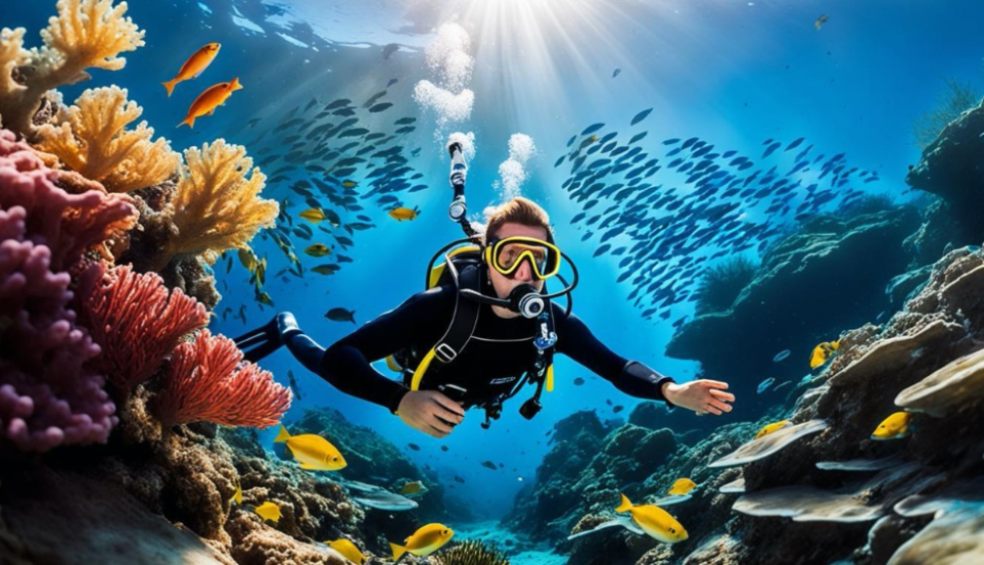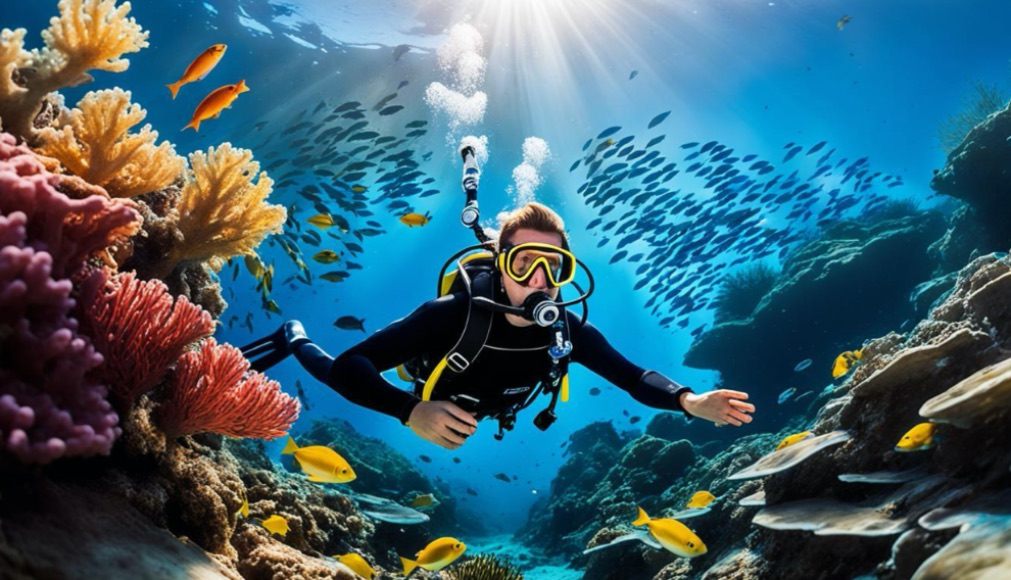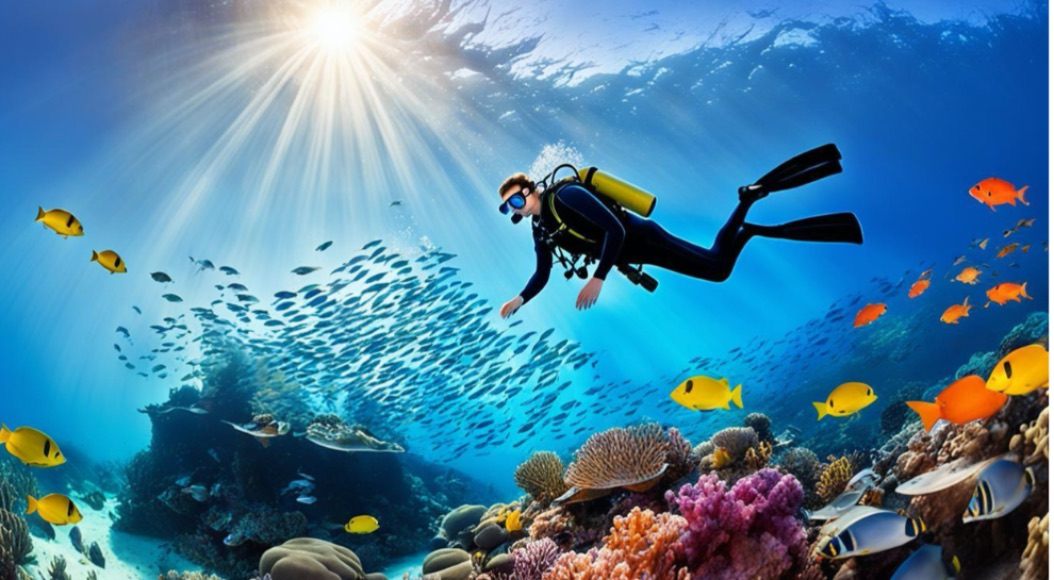
Can I go Scuba Diving if I Can't Swim?
Scuba diving is a captivating activity that allows individuals to explore the enchanting underwater world. But what if you can't swim? Does that mean you have to miss out on the impressive experience of underwater exploration? The answer is no! Even if you can't swim, you can still enjoy the wonders of scuba diving. Thanks to modern scuba equipment, non-swimmers can participate in introductory dives or courses like Discover Scuba Diving. These programs provide a safe and controlled environment for non-swimmers to embark on their unforgettable scuba diving journey.
One such destination that offers world-class diving opportunities for non-swimmers is Nusa Penida. With its breathtaking dive sites and reputable dive centers, Nusa Penida is the perfect place to begin your scuba diving adventure, even if you can't swim.
Key Takeaways:
- Scuba diving is possible for non-swimmers through the use of scuba equipment and appropriate training.
- Nusa Penida, famous for its dive sites, offers an excellent opportunity for non-swimmers to explore the underwater world.
- Introductory programs like Discover Scuba Diving are designed specifically for non-swimmers, allowing them to build water confidence and enjoy scuba diving.
- While it is possible for non-swimmers to scuba dive, it is important to prioritize safety and choose a reputable dive center.
- With the right preparation, training, and guidance, non-swimmers can embark on safe and unforgettable scuba diving adventures.
Exploring the Underwater World: Non-Swimmers Edition
Modern gears offer an extraordinary opportunity for non-swimmer scuba divers to delve into the stunning underwater world and witness marine life up close. Despite not being able to swim, non-swimmers can still experience the wonders of the ocean by donning scuba equipment and venturing beneath the surface.

- The Benefits of Scuba Diving for Non-Swimmers
Scuba diving provides numerous benefits for non-swimmers. Firstly, it allows them to overcome their fear of water and build water confidence. By becoming familiar with scuba equipment, non-swimmers can gradually develop comfort and feel safe in the water. Additionally, scuba diving promises a transformative experience for non-swimmers. As they explore the underwater world, they are exposed to breathtaking marine ecosystems and encounter a myriad of fascinating creatures.
- Overcoming Water Confidence Issues
For non-swimmers, the thought of going underwater may initially be intimidating. However, scuba diving provides an ideal platform for overcoming these water confidence issues. The scuba gear, including a buoyancy control device (BCD) and fins, provides support and facilitates efficient movement underwater. With the proper guidance and training from experienced scuba instructors, non-swimmers can gradually conquer their fears and become more comfortable in the water. The controlled environment offered by scuba diving ensures that non-swimmers can explore the underwater world at their own pace, helping them overcome water confidence issues with each dive.
Explore World-class Diving Sites Like Nusa Penida with Scuba Equipment
When it comes to scuba diving, the world is your oyster. With the right scuba gear, you can explore the depths of world-class dive sites in Nusa Penida, a stunning tropical island in Bali. Scuba gear plays a crucial role in empowering non-swimmers to venture into the underwater world and experience the wonders that lie beneath the surface. Scuba equipment plays a crucial role in empowering non-swimmers to enjoy the wonders of magical undersea world. With the help of fins, buoyancy control devices, and other essential gear, non-swimmers can navigate underwater with ease. Scuba equipment provides the necessary support and enhances safety, allowing non-swimmers to focus on the diverse marine creatures surrounding them.

A. How Scuba Gear Can Empower Non-Swimmers
Scuba gear provides the necessary tools for non-swimmers to navigate through the underwater world with ease. The use of fins allows for efficient movement, while the buoyancy control device (BCD) helps maintain stability in the water. The mask ensures clear vision, allowing non-swimmers to witness the beauty of marine life up close.
B. The Accessibility of Scuba Diving for Everyone
Scuba diving is a sport that is accessible to everyone, regardless of their swimming ability. With the right training, guidance, and equipment, non-swimmers can safely participate in scuba diving activities. Scuba gear provides the necessary support and confidence for non-swimmers to explore the underwater world with ease. Whether you're a beginner or an experienced diver, scuba diving is an inclusive activity that welcomes individuals of all backgrounds.
C. The Importance of Hiring a Trusted PADI Dive Center when Diving in Protected Areas
When embarking on scuba diving adventures in protected areas like Nusa Penida, Raja Ampat, Nusa Lembongan and more, it is crucial to choose a trusted PADI dive center. These dive centers prioritize safety and provide professional instruction to ensure a safe and enjoyable diving experience. By hiring a trusted PADI dive center, you can have peace of mind knowing that you are diving with experienced professionals who adhere to diving regulations. Explore the world-class diving sites with confidence, knowing that you are in capable hands.
Signing Up for Scuba: What Non-Swimmers Need to Know
Before starting a scuba diving journey as a non-swimmer, there are important considerations and steps to take. By understanding these factors, non-swimmers can make informed decisions and prepare themselves for a safe and enjoyable scuba diving exploration. Let's explore what non-swimmers need to know before signing up for scuba diving.
- Scuba Diving Certification: Non-swimmers who are interested in scuba diving should first obtain a scuba diving certification. This certification ensures that individuals have the necessary knowledge and skills to dive safely. There are various scuba diving certification agencies, such as PADI, that offer comprehensive courses for beginners.
- Swimming Lessons: Although non-swimmers can participate in scuba diving, it is highly recommended to take swimming lessons before starting the scuba diving certification process. Swimming skills provide an added layer of safety and comfort in the water. Learning basic swimming techniques and gaining confidence in the water can significantly enhance the scuba diving voyage.
- Safety Precautions: Non-swimmers should be aware of and adhere to specific safety precautions when participating in scuba diving. These precautions include diving with a certified dive instructor or buddy, following proper diving procedures, using appropriate scuba equipment, and maintaining good communication underwater. It's essential to prioritize safety at all times to ensure a memorable and accident-free scuba diving exploration.
By taking scuba diving certification courses, acquiring swimming skills, and practicing safety precautions, non-swimmers can embrace the exciting world of scuba diving. Remember, scuba diving is an incredible journey that allows individuals to explore the wonders of the underwater realm, regardless of their swimming abilities.
Conclusion
In conclusion, scuba diving is an accessible and thrilling activity for everyone, including non-swimmers. While being able to swim is beneficial, non-swimmers can still explore the underwater world by utilizing scuba equipment and participating in guided dive expedition. With the right training and precautions, non-swimmers can enjoy the wonders of scuba diving and create unforgettable memories beneath the surface. When venturing into scuba diving paradises like Bali, home to tens of magical diving and snorkeling spots, it is crucial to choose a certified dive operator, a good example can be found here at Nusa Penida dive center. A certified dive operator usually offers comprehensive training programs and maintain high-quality equipment, providing a secure and enjoyable environment for non-swimmers to explore the underwater realm.
Building water confidence is essential for non-swimmers wishing to participate in scuba diving. Through introductory courses and practice sessions, individuals can gradually become comfortable in the water and develop the necessary skills to navigate and enjoy the underwater environment. With increased water confidence, non-swimmers can overcome any initial hesitation and fully embrace the diving expedition. By understanding the accessibility of scuba diving, choosing a trusted PADI dive center, and building water confidence, non-swimmers can have a remarkable journey and witness the striking beauty that lies beneath the surface
FAQ
Can non-swimmers go scuba diving?
Yes, non-swimmers can go scuba diving with certain precautions and training. While being able to swim is beneficial, non-swimmers can still enjoy the underwater world by utilizing scuba equipment and taking part in guided venture.
What is the beauty of Nusa Penida's dive sites?
Nusa Penida's dive sites offer breathtaking beauty, including lively coral reefs, fascinating underwater rock formations, and encounters with magnificent marine creatures.
How does scuba equipment empower non-swimmers?
Scuba equipment, such as fins and buoyancy control devices, empowers non-swimmers to navigate
What do non-swimmers need to know before signing up for scuba diving?
Non-swimmers should be aware of the requirements for scuba diving certification, the importance of swimming lessons, and the safety precautions involved in scuba diving.
Is scuba diving accessible for everyone?
Yes, scuba diving is accessible for everyone, including non-swimmers. With the right training, equipment, and guidance from a trusted PADI dive center, non-swimmers can have on safe and enjoyable scuba diving adventures.
Why is it important to hire a trusted PADI dive center?
Hiring a trusted PADI dive center ensures a safe and professional dive exploration, with knowledgeable instructors who can provide the necessary training and guidance for non-swimmers.
How crucial is building water confidence for non-swimmers?
Building water confidence is crucial for non-swimmers as it enables them to feel more comfortable and secure in the water, enhancing their overall scuba diving experience.













